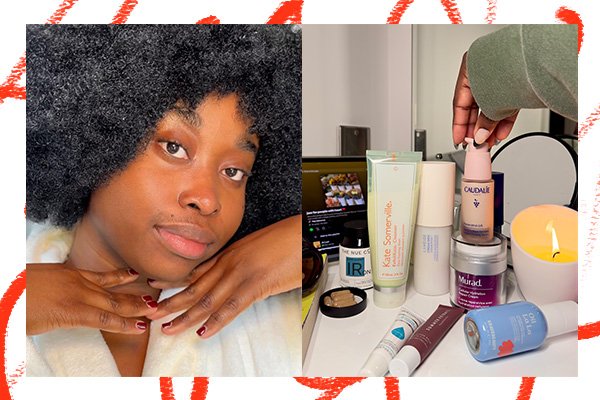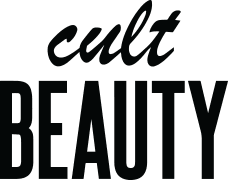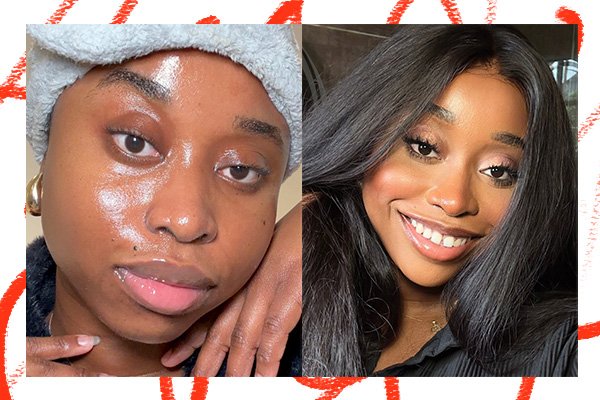
Our Beyond Skin Deep series amplifies individual skin stories, encouraging exploration and sharing of all experiences and journeys. Peju Adesanya (@theeskinfriend), a 27-year-old lawyer and gender consultant, shares her story of practicing skin compassion with Polycystic Ovary Syndrome…
On my 13th birthday, one of the gifts I got from a classmate was a pack of sanitary pads; she gave them to me as a joke — a bad one at that — because I was one of the last few people in my year to start my period. At the time, it stung. I felt like my body was failing me somehow, that there was something wrong with me.
But, just one month later, as if my body was acting in retaliation to that unwelcome gift, I finally got my first period. I was ecstatic to at long last be invited into the club in which members covertly slid pads under cubicle doors and whispered about their cycles syncing up. I was over the moon with excitement knowing I could now participate in that sacred ritual of togetherness.
Over the next year, my period slowly settled into a regular cycle. At first, I didn’t experience too many symptoms, aside from cramps and a bit of muscle soreness here and there. After the first year, though, things changed. My periods became more and more infrequent, and I’d sometimes go up to five months without getting one. When I did, my symptoms were all over the place — I either had a super heavy flow lasting 10 days or a light flow that lasted only a couple.
Even though there was so much inconsistency, I didn’t think much of it at the time — I just assumed my period would settle as I got older. But, three years later, things were still the same. That’s when I finally told my mum about it, and we booked in to see a gynaecologist. I feel fortunate that I got to see a female gynaecologist because I’ve since heard lots of stories about people feeling dismissed by their doctor, particularly those that are male and struggle to relate to the experiences we as women have with our body.
Listening to my symptoms, the doctor suspected I had Polycystic Ovary Syndrome (PCOS), but I wasn’t diagnosed right away. I spent the next seven weeks undergoing various tests, including multiple pregnancy tests, to rule out any chance I was pregnant, and various blood tests to check for hormonal imbalances or any other medical conditions. The results showed I had unusually high levels of testosterone, which is a major symptom of PCOS. And that wasn’t all, as the final step was an ultrasound scan, which revealed a high number of follicles in my ovaries — evidence that my body wasn’t ovulating. All these factors finally added up to a diagnosis of PCOS.
PCOS is characterised by a wide range of symptoms (such as hormonal acne, pigmentation and difficulty getting pregnant), which may not always present the same way in everyone, but in the 10 years since I’ve been diagnosed, I’ve experienced many of these…
THE IMPACT OF PCOS
For me, PCOS has resulted in weight gain (leading to body image issues), as well as crippling anxiety and insomnia. This means I’m in a perpetual state of fatigue, feeling too tired to get anything done and further increasing my anxiety levels as I worry over deadlines and my to-do list at work, causing yet more sleepless nights. And so, the cycle continues.
Hirsutism (excessive hair growth on the face and body) and hair thinning are two more tell-tale signs of PCOS that I frequently struggle with. My body produces more testosterone than it needs, so I grow hair in places I’d rather not and lose hair in places I’d like it to stay. Because of this, I choose to shave my both my face and body, perhaps more frequently than those without PCOS — but everyone has a different preference and it’s important to only do something (or not do it) because you want to, rather than because others think you should.
Over the years, I’ve learnt tips on how to shave without causing bumps and ingrown hairs. When shaving my face, my top tip is to exfoliate a few days before the hair removal process, then use an oil cleanser on the day. I always go for the Biossance Squalane + Antioxidant Cleansing Oil and leave that on as a lubricant. Opting for a sharp razor, like these Votary Magic Razor Wands, is also important. Having a sharp razor means you don’t have to run the blade over the same area continuously, causing friction that can increase irritation.
The same concept applies to shaving my body. I use an exfoliating wash in the days before and after shaving to help prevent ingrown hairs. Again, using a sharp razor is essential, which I typically pair with a shaving foam to help soften and lubricate my skin during the process. Aftercare is so important as well, so I make sure to use hydrating serums and a soothing moisturiser to calm my skin.
I don’t typically deal with acne but shaving my face so often leaves me vulnerable to bumps and hyper-sensitive, textured skin. I like to alternate between two cleansers from Kate Somerville to combat this; the Kate Somerville EradiKate Daily Foaming Cleanser and the Kate Somerville ExfoliKate Cleanser — both of which are great options for dealing with hormonal acne and shaving bumps.
Retinol is often touted as a cure-all for lots of different skin concerns and I’ve come to rely on its more efficient big sister; retinaldehyde, to keep my skin firm, healthy and bright (as well as tackling the acne and pigmentation caused by PCOS). My go-to retinal product is the Medik8 Crystal Retinal because it gives me optimal benefits without being too harsh on my already sensitive skin. I take occasional breaks from the retinal and use other firming serums like the Caudalie Resveratrol-Lift Instant Firming Serum, which helps keep skin plump and is antioxidant rich.

